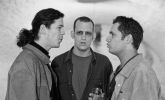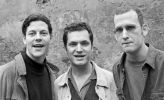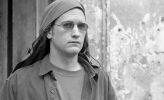Entarctic Shelf Festival: 23 June – 3 July, 1995
A.W.O.L. Love Vibe is a polyvocal action poetry, gripping, stimulating, cathartic rhythms, a trio with performative word powers, ranging from raunch to staunch, the group´s three members are all trained professionals, each having achieved acclaim working in a chosen field of expertise.
A.W.O.L. Love Vibe explores the extremes of vocal communication – from romantic delirium to industrial spasms. In Plasy they devoted their time to improvisation poetry, music and teaching other people to communicate without reading and borders.
A performance trio made up of John Sobol, Kedrick James, and Alex Ferguson. During their residency in Plasy monastery they avoided reading or writing for the three weeks they spent there.
Dicta
speak these words aloud. memorize them. alter them. then burn this page.
the spider of the mouth spins a sonic web. it dies on the cusp of the moment.
overcome the will to text! let your own voice-body seduce you.
speech burns the robes off Psyche
every utterance-breath is a beginning
every written-typed word is a closure
the scribbled mind begs more than deliverance from change
the oral mind prizes the genius of invention
by reading this you have ceased to engage in the world around you
a wasteland was encountered in the scriber´s hive. we washed the happy tongue
in the oasis of Plasy.
1995
John Sobol: As an oralist, Sobol is a professional saxophonist, performance poet and public speaker with over 1,000 gigs to his credit in a dozen countries since 1979. He has traveled widely to apprentice, record and perform with renowned artists and elders from diverse oral traditions. He worked as a story producer for CBC national radio and ran his own record label called Word of Mouth. He co-curated the Monologue/Dialogue performance art festival, created Canada’s largest spoken word gathering at The Banff Centre for the Arts, and toured an acclaimed one-man show called Two Million Years of Technology. He has performed around the world (Seattle, Bangkok, New York, New Orleans, Stockholm, London, Prague, San Diego, etc.) and appears on a dozen CDs and LPs.
soboltalk@gmail.com
Kedrick James is a spoken word and multimedia artist, network theorist, teacher and academic researcher. His work applies concepts of procedural poetics and cultural recycling to words, sound and images. He was a classically trained musician who gave up that path to travel the world. He has since settled in Vancouver, Canada where he works as an instructor of language and literacy education focusing on applied linguistics and arts-based research at the University of British Columbia. His most recent accomplishments include producing an award-winning dissertation on the poetics of sustainability, an edited textbook on teaching English language in Canada, and a vinyl record called The Minute Album. Kedrick James is also a dedicated collector and vinyl archivist and sports a collection of over 6,000 records.
kedrick.james@ubc.ca
Alex Lazaridis Ferguson is a multi-disciplinary performance maker with a background in theatre. He has recently directed Nanay: A testimonial Play at PETA in Manila, performed in Penelope _by Enda Walsh (Rumble Productions), performed in _Bamboozled! (MACHiNENOiSY Dance-theatre). He began collaborating with Steven Hill in 2013 on Der wink. His chief interests are in performance spaces and performance design. Alex has contributed writing on performance to Theatre Research in Canada, Canadian Theatre Review, and Urban Mag (Belgium). He is a regular contributor to RealTime Arts (Sydney, Australia). Alex is a graduate of Studio 58 and Theatre at UBC.
John Sobol: Sound Trek – Adventures Beyond the Alphabetized Universe
(Originally published in _BorderCrossings Magazine in 1995.)_
My writing these words marks the conclusion of a poetic experiment with creative illiteracy. Or, to be more precise, with post-literate orality. For the past month I have neither read nor written a single word, and as I sit here at my humming computer, reflecting on my written-word fast, I feel very strongly that I would prefer to stay in the realm of the oral. Unfortunately, I make my living as a writer and have promised this article to Bordercrossings. So with an ominous sense of tumbling headlong from a spacious plateau of freedom, spontaneity and humour towards one of shackled, rigidity far below, I hereby re-enter the literate world with a chronicle of my month-long adventure beyond the alphabetized universe.
Firstly let me describe my companions on this journey, for I was not alone. I embarked on this experiment with two poetic collaborators, Kedrick James and Alex Ferguson. I too am a poet, and collectively the three of us are AWOL Love Vibe, a Vancouver- based polyvocal action poet-trio. We perform our poems in nightclubs, high schools, art galleries and political rallies -- an all-purpose Ambulatory Oral Ambulance.
In March of this year we received an intriguing invitation. Were we interested in attending Hermit, a month-long interdisciplinary art symposium held in a former Cistercian monastery in a remote corner of the Czech Republic? After several milliseconds of intense discussion, the unanimous answer emerged: YES! And so, after a bit of fundraising (broken piggy-bank remains scattered across bedrooms) we set off for our spiritual home: Bohemia.
The idea of re-oralizing ourselves developed gradually as we prepared for our trip. We had been reading and re-reading several brilliant works dealing with the historical transition from orality to literacy, notably Walter J. Ong’s Orality and Literacy, Julian Jaynes’ The Origin of Consciousness in the Breakdown of the Bicameral Mind, Marshall Macluhan’s The Gutenberg Galaxy, and Jerome Rothenberg’s anthologies of “Primitive Poetries”. Ong’s book in particular describes in concrete terms how fundamentally different are the literate and oral psyches. Ong explains how primary oral cultures, those which have never even encountered the idea of writing, share values, rituals, even thought processes which are deemed unneccessary and hence worthless by literate societies. As performing poets pursuing the implications of poetry as an oral art, we agreed to find out for ourselves what a temporary respite from literacy had to teach us. Our visit to the Czech Republic seemed an ideal opportunity to attempt, to the best of our highly literate abilities, to re-oralize ourselves.
Upon arriving in Plasy, after a long journey by car, air, bus, boat and rail, we found ourselves in a sprawling, dilapidated and outrageously evocative monastic complex. The vast site was virtually empty and we wandered around a good while before encountering Laika, who recognized us as the three wandereing poets from Canada and welcomed us to Hermit. The accommodations and amenities were rudimentary to say the least (no heat, very occasional hot water in the only shower, wood stove for cooking, 6-8 people to a room) but our companions were friendly and interesting and in the same boat, so we dug in and set to work.
Our first concern was medical, for despite the magnificence of the monastery, with its lofty chambers, empty granaries, and beautiful chapels, we had trouble finding a space which wasn’t layered with several centuries worth of dust mites and batshit. The place was perfect for visual artists, for whom the countless nooks and crannies offered a site- specific playground of unusual grandeur, but their needs were different than ours. We needed to make noise, to jump around, to breathe deeply over and over. And we could tell right away we were going to have a hard time with the dust. Oddly enough it turned out that the best place to work was our very own communal bedroom. So while our comrades were out sawing, digging, plastering and carving, we stayed inside and kicked out the poetic jams between rumpled sleeping bags.
Our process was one of trial and error. We invented a wide variety of exercises to develop our oral poetic skills, and after a while certain patterns began to emerge. We had spent quite some time searching to define the poetic equivalent to a musician practising scales. What exercises could we do that would provide the same sort of fluency with materials? At first we experimented with very specific metrical and linguistic techniques. We tried, for example, inventing sentences and then substituting individual vowels and consonants to form new sentences. “The fast bird falls into the sea...the first bard files into the saw...the burst beard smiles onto the sun...etc.” But as challenging as this exercise was, it didn’t seem to offer much help when it came to extemporizing legitimate poems.
Eventually we came to the conclusion that the oral poet’s scales were not quite so formulaic and limiting as we had thought. Instead of focussing on specific phonemes, words or grammatic structures, our exercises seemed to be most useful when they developed our ability to think and perceive poetically. What this came to mean for us was developing our ability to think our way around a subject, to get inside it, to see under it, to understand everything possible about it, and to articulate those insights with words released on a breath. At first this was as simple as choosing an object, any object -- a broom, a tree, a stovepipe -- and taking turns defining all of its physical characteristics; what words describe its shape? Its colour? Its texture? We would then assess its sensual nature; what might it sound like? Taste like? Smell like? Feel like? And then on to its history and its relation to the world around it, and its relation to us. And finally into the psychology of the object; its fears, its desires, its dreams. What is the stovepipe afraid of? (rust, an earthquake, boys with slingshots). What are the desires of the stovepipe? (smoke, chimney swifts, to be banged on by Max Roach). All of these imaginative projections, expressed in metaphor, in sound, in everyday language, created a catalogue of kinds of awareness, kinds of poetic descriptions. They contributed to the broadening of the multiplicitous eye, the poet’s circular gaze. They emerged as a poetic scale and became one important aspect of our oral practice.
But just one, for the scope of our project proved immense. We worked on as many poetic techniques as we could think of. We did a daily voice workout led by Kristin Linkletter, whose taped voice became a familiar and welcome muse. We did endless sound poetry jams. We invented and retold epic poems in order to better understand the nature of narrative storytelling and mnemonics. We practised extemporizing to different rhythmic backgrounds. We worked on three-part harmony. We invented poetry exercises called Crow, Brick, Verbal Tennis (stolen from Tom Stoppard, that one) and Zodiac. And we worked on memorizing and arranging a very long poem called Sonic Food Sound Skin, which Alex had written some time before.
What is the Meat of Poetry?
It is the meat of understanding
It is the knife cutting sinew
The bone from which the blood hangs The rain of plasma collecting in scapula It is the word sticking to the rib
It is the word too big for the heart caught like a hairball in the throat
It is the coughing up of sound
when the body rejects the word
It is every space between the jaw electrically activated by the tongue
(Excerpt from Sonic Food Sound Skin, by Alex Ferguson.)
This poem offers an example of how our methodology changed as we became more fluently oral. At home, working from the page, it had seemed intensely daunting -- page after page of poetic sound and fury. But later, when it was read out loud to us a few times, section by section, we found ourselves able to memorize whole gobs of it at once and capable of arranging it for the trio entirely out of our heads. Making sounds and visualizing images proved vastly superior to simply looking at letters on a page when it came to storing the poem in our long term memories.
There’s an honesty which accompanies oral practice which is absent from literature. For example, you are unaware that somewhere in the last paragraph I stopped writing for a few days and have only just returned. When working orally you can’t slip away from your audience for three days without them noticing. Nor can’t you recall or edit what has been said. During our month in Plasy, we learned to detach ourselves from our words as representations of our egos. The point was to say something, anything, to try to communicate. Nothing was too foolish for us -- as our roommates, who had on occasion to put up with some pretty tasteless juvenalia, may wish to affirm. But you have to walk before you run, and this was our way of releasing ourselves from the tyranny of words as absolutes , imposed by print. Oral poems live and die in the moment. They are not intended to be repeated, or not precisely anyway. Variations become essential to the evolving poem. There is no fair copy, no final draft; there is only the particular circumstances of its recreation. This line, which I am about to complete, will never change once it is printed. The essence of the spoken poem, however, is change -- from nonexistence to sound and back again into nonexistence. To quote Ong, “In an oral culture, when a story is not being told, all that exists of it is the potential in some people to tell it.”
We ended up performing Sonic Food Sound Skin inside the old refectory, for the kickoff of the Hermit Festiva_l which concluded the residency. It was our fourth public performance in the Czech Republic, the others having been at the Roxy in Prague, at Klatovy - a mediavel castle turned art gallery, and at the monastery itself where we had done a performance-video with two Italian installation artists who had built a tennis court in the old ice cellar. We began reciting _Sonic Food Sound Skin in the rafters of the gutted building, walking on ancient beams 20 metres above the heads of our audience. During the course of the 15-minute piece we gradually descended the wooden stairwell, ultimately dropping beneath the floorboards and continuing our poem from beneath the audience’s feet. The finale consisted of our striding out into the magically resonant corridor and leaving for the local pub, still reciting the poem’s looped ending. The Pilsener flowed freely that night; it was a fine way to end our stay.
I am more convinced than ever that orality, which demands and teaches intimacy, immediacy, spontaneity, imagination, relevance and a host of other beneficial human traits, has a great deal to offer literate societies. In particular, it has everything to teach poets. The printed word has been the vehicle for an extraordinary outpouring of poetry, but until very recently that poetry was nearly always tied to a distantly remembered orality. Today, in scanning the lonely lifeless shelves of contemporary poetry, it is clear that The Book has finally hounded the living voice from its pages. Fortunately, poets are finding their tongues again without the aid of print. Led by poets born of cultures with still vital oral roots, by those cultures which have resisted typographic colonization and assimilation, led by rappers and dub poets and Indians and tv culture and rock’n’roll, post-literate orality is on its way. This is not the end of intelligence and schooling, as some fear. It is the reassertion of a passionate and vital communicative paradigm, a loud, colourful, sweaty, articulate investigation of the here and now. Literacy is about to take a backseat to a world of oral possibility. So hang on tight, and please, speak into the microphone.


